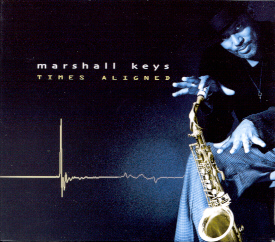Marshall Keys - Times Aligned
 I
often got in a path with the saxophonist Marshall Keys. He played on
albums of Grainger ("Phase
I + II"), David Dyson
("Soulmates"), Marcus
Johnson ("Chocolate City Groovin'", "Urban
Groove", "Inter Alia"), Dan
Reynolds ("Never Alone", "To Be Shure") among
others. Keys's performing credits also include gigs with jazz
luminaries Lionel Hampton, Clark Terry, Steve Allen, Jimmy
Witherspoon, Big Joe Turner, Sonny Stitt and Branford Marsalis as well
as recordings with Cyrus Chestnut, Vinny Valentino, Gary Thomas, Dave
Valentin and jazz fusion artists John Stoddart, Keith Killgo,
Kirk Whalum, and Paul Jackson Jr. Marshall Keys also recorded the
album "Countdown" with McGriff and still occasionally tours
with his band.
I
often got in a path with the saxophonist Marshall Keys. He played on
albums of Grainger ("Phase
I + II"), David Dyson
("Soulmates"), Marcus
Johnson ("Chocolate City Groovin'", "Urban
Groove", "Inter Alia"), Dan
Reynolds ("Never Alone", "To Be Shure") among
others. Keys's performing credits also include gigs with jazz
luminaries Lionel Hampton, Clark Terry, Steve Allen, Jimmy
Witherspoon, Big Joe Turner, Sonny Stitt and Branford Marsalis as well
as recordings with Cyrus Chestnut, Vinny Valentino, Gary Thomas, Dave
Valentin and jazz fusion artists John Stoddart, Keith Killgo,
Kirk Whalum, and Paul Jackson Jr. Marshall Keys also recorded the
album "Countdown" with McGriff and still occasionally tours
with his band.
His first album was long awaited.
Marshall concedes: "The longer I waited, the greater the pressure
was to make a good recording and a really strong statement". Originally
the album should be called "First Born" and released in late
summer 2001. Finally "Times Aligned" came to light in 2003.
The title track written and arranged by the bassist Scott Ambush refers
(ironically?) to these concurrence of events and/or obstacles. Scott produced
most parts of the album. Times Aligned is
a fusion tune with expanding solos of Marshall on alto saxophone and
Alex Norris on muted trumpet.
This album isn't radio-like with many
tracks longer than 6 minutes. Marshall comments: "I imagined this
CD as an ensemble record in which would be space for everyone to
play." Fifty-5 makes no difference.
Marshall's soprano sax is in the center of interest. Vinyl Valentino
on guitar adds his solo part.
Rhythm is dominating the character of
a piece as to shown up on Night Vision.
Marshall has taken an Acid drum loop. After replacing the bass
line, the chords and finally the melody Raymond Angry has created an
upbeat urban groove.
The impression of this album as a
masterpiece is mainly generated by Eva Hambach, who has made all photography's
of this album and also art direction, concept and design. But Eva also
contributed the tune La Marsa to this
album. La Marsa is named for the suburb of Tunis, where Eva lived when
she wrote the song. Eva also plays on this track the harmonica with
much sensibility. Marshall's new website is designed by Eva too.
The Body That
Loves You was originally released on Janet Jackson's album
"janet.". Marshall was impressed by the melody of this song
he initially heard in a cinema waiting on the movie. By the way
Marshall isn't the only jazz player who covered this song. Calvin
Stokes took this song for his cover album too.
Open Canvas
is a soundscape by Frederico Gonzalez Peņa. The song was developed
from a three-note motif that Frederico came up with one afternoon
while he and Marshall were playing on an exhibition of new works by
the cubist/abstractionist Joseph Holston. The affinity and similarity
between both directions of art is obviously.
Suspended
is a reverie with diminishing melody contours.
Very contemplative and sensitive is
the approach of Usmio. Marshall comments:
"This was the first song I wrote after Vinny helped me set up my
studio. The omposition unfolds the way I think a good solo should,
with an opening statement that evolves slowly and deliberately. Gilad
sets it up with a perfectly placed bell at the end of the intro and
Vinny'shaunted guitar gives the whole piece a wonderful moody
quality."
Anywhere You
Say is an hommage to Pat Metheny 's song "Are You Going
With Me". Very elegant and sophisticated this piece is written
more for the brain less for the foot.
Marshall's original idea of Almond
Eyes was to feature Scott Ambush. Marshall gave him the
sequenced arrangement to learn and he, in turn, played it for his
friend and bandmate Tom Schuman, who meticulously orchestrated it for
sampled strings and added a few flourishes of his own like the
pizzicato violins. In the end a romantic piece of timeless beauty.
This album isn't conceived for smooth
jazz radio. Marshall has consequently realized his imagination of
music. What an ambitious endeavour. What an enthralling translation
into music.


